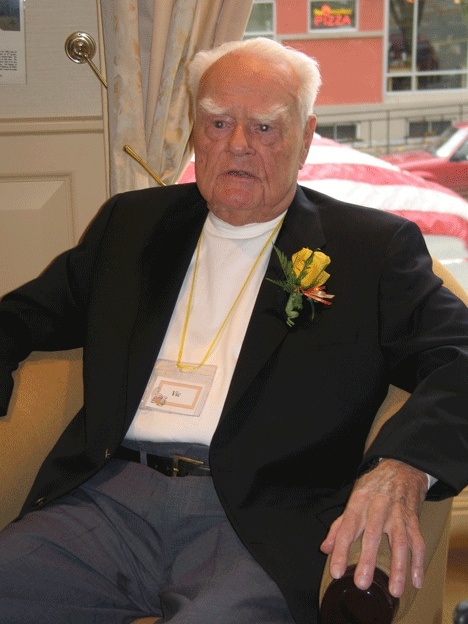It’s not every day you turn 103 years old.
Dr. Victor Blanchard Scheffer celebrated that milestone yesterday.
But he also did something else that was notable. Scheffer managed to impress Mayor Paul Samuelson so much with a life devoted to science and one committed to the defense of animals, that, at the behest of Scheffer’s granddaughter Linda Irvine and other family members, the Langley mayor formally proclaimed Nov. 27, 2009 — Scheffer’s 103rd birthday — as Dr. Victor B. Scheffer Day.
“I make it a habit of honoring special people in special ways,” Samuelson said.
“It’s my way to recognize specialness in our community.”
Bill Carlstrom, Scheffer’s son-in-law, said the proclamation was made at the city council meeting on Nov. 16. A small party was held the following day at Scheffer’s place of residence, the Saratoga View Family Home in Langley.
“His 97-year-old sister accepted the proclamation at the meeting,” Carlstrom said.
“Paul came over to Saratoga View the next day to have a little celebration and to present the proclamation to my father-in-law in person. The entire event was quite beautiful and emotional,” he added.
Scheffer was born in Manhattan, Kan., on Nov. 27, 1906.
He earned his doctorate in zoology in 1936 at the University of Washington.
He joined the U.S. Bureau of Biological Survey in
1937, which would later become the U.S. Fish & Wildlife Service, where Scheffer would devote his skills as a scientist for the next 33 years.
Through the course of his career, Scheffer worked from Alaska to southern California, and in many places throughout the rest of the world, studying everything in the sea from marine mammals to seaweed.
Besides teaching part time at the University of Washington, a National Science Foundation grant made it possible for him to study at Cambridge University, England, where he wrote his first book, “Seals, Sea Lions and Walruses.”
As a scholar, scientist, environmentalist and conservationist, he would go on to write 15 books and numerous scientific articles. His book “The Year of The Whale” received the John Burrough’s Medal for 1969’s best natural history book and sparked the worldwide movement to ban whale hunting.
In 1973, President Nixon appointed Scheffer chairman of the first International Marine Mammal Commission.
A few of his other honors include the Joseph Wood Krutch Medal, given by the Humane Society in 1975, in recognition of Scheffer’s commitment to defending nature and animals, and to the prevention of cruelty. He was also presented with the University of Washington Alumnus’ Summa Laude Dignatus Award for his lifetime work as naturalist, conservationist and internationally recognized mammalogist.
The Seattle Audubon Society honored him with its 2005 Science Award and the Wildlife Society recognized his extraordinary career by presenting him with its Special Recognition Service Award for his 75 years of professional service.
Scheffer is a founding member of the Nature Conservancy’s Washington chapter and perhaps the state’s longest-living conservationist.
However reluctant to admit his artistic talent, Scheffer made use of a series of artistic photographs of nature in his book “The Seeing Eye” to study color, form and texture. His catalog of more than 9,000 photographs serves as a diary of his professional life.
Scheffer, who has three children, eight grandchildren and four great-grandchildren, claims that genetics is responsible for his intense interest in the natural world, and his longevity. (His father worked as a biologist and lived to be 99.)
When asked what it was that allowed him such a successful life, Scheffer said,
“A sense of wonder.”



